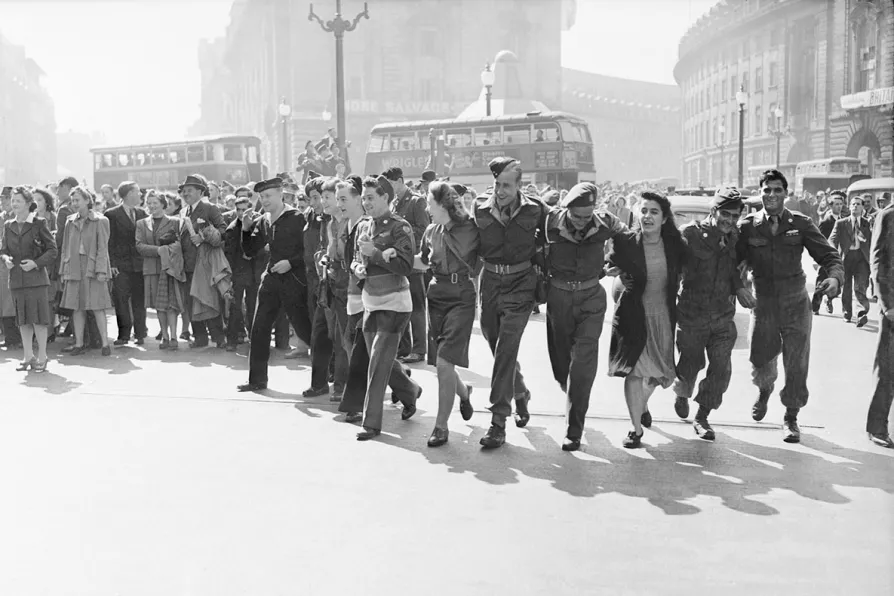
 Civilians and service personnel in London's Piccadilly Circus celebrate the news of Allied Victory over Japan in August 1945
Civilians and service personnel in London's Piccadilly Circus celebrate the news of Allied Victory over Japan in August 1945
COMMEMORATIONS marking Victory over Japan (VJ) Day are more muted in Britain than VE day three months earlier.
Though many British soldiers fought the Japanese, the war was further away than that in Europe and their atrocities are less well known here than those of the Nazis. The horrific end of the war in Japan, with the US dropping of atom bombs on Hiroshima and Nagasaki, has also cast a long shadow over celebration of its surrender.
Imperial Japan’s defeat was less total, too: the emperor was left on the throne, and there was no equivalent to the Nuremberg Trials, meaning many individuals guilty of appalling crimes were never held accountable.
That feeds a long-running battle over historical memory both in Japan and between it and the countries it attacked, much more so than in Germany.
Regular diplomatic spats erupt over Japanese politicians visiting the Yasukuni shrine honouring the war dead, which includes the names of convicted war criminals, and over accounts of the war taught in Japanese schools trying to present the sexual slavery imposed on captured Korean women as a voluntary arrangement.
This historical revisionism has become more marked in the last 15 years, especially during the premierships of Shinzo Abe, the grandson of a war criminal himself.
Does it matter? Japanese Communist Party chairwoman Tamura Tomoko points out that “the continued presence of historically retrograde forces at the heart of Japanese politics, who have affirmed and glorified the war of aggression… is one of the root causes of the recent new wave of extreme right-wing politics and xenophobia.”
She links those same forces to “the building of a war state, at the behest of the United States… embarking on the path of massive military expansion,” one now sending troops abroad and “despite being the only country to have suffered atomic bombings in war… even conducting joint training exercises [with the United States] that assume the use of nuclear weapons by the US.”
Japan is being primed as a front-line state in the US encirclement of China, one which US General Mike Minihan predicted would erupt into a war as soon as this year.
It is, like South Korea, already the base for tens of thousands of US troops.
Nationalism, rewriting history and rearmament — depressingly familiar to us in Europe. But Japan also offers a glimpse of a different path.
Its unique Peace Constitution asserts that “the Japanese people forever renounce war as a sovereign right of the nation and the threat or use of force as means of settling international disputes.” Multiple governments have sought to scrap this famous Article 9, and it has been undermined in practice.
Yet this declaration — originally a result of defeat, imposed on Japan by the US — has for millions become a badge of honour, a sign not just of penitence for an imperialist past but of a country that has emerged from horrific conflict and determined that such conflict should never be permitted again.
It was Japan, in the 1950s, that pioneered “civil clauses” adopted by companies and universities, vowing never to engage in military-related research or projects. Something which spread to the other chief aggressor of World War II, Germany, but would be worth campaigning for in all imperialist states, including Britain.
The rearmament drive gripping Europe and Japan is excused by the supposed need to defend ourselves against aggressors: yet the history of Britain, like that of Japan, shows it was more often the aggressor. With our government facilitating horrendous war crimes in Palestine, after decades in which we have attacked Yugoslavia, Afghanistan, Iraq and Libya, who can doubt this is still the case?
The British left, like that of Japan, should embrace peace as its guiding principle. Those trying to rewrite the last world war are also dragging us towards a new one.










